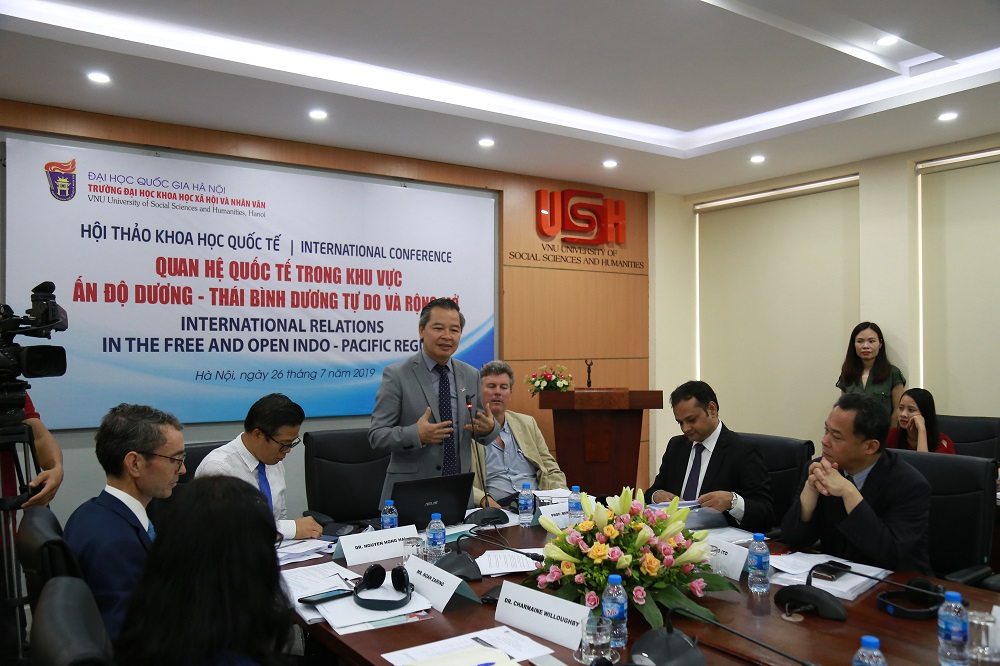
Indo-Pacific region was defined in America's National Security Strategy 2017 as "the region stretching from the west coast of India to the west coast of the United States". The concept of Indo-Pacific was not really new, but only when reiterated by President Donald Trump in his speech on the sidelines of APEC 2017 did it begin to attract widespread attention. The shift from the concept of "Asia-Pacific" to "Indo-Pacific" in the US' strategy implies an extension of a region that focuses only on "East Asia and West Pacific" to one with additional countries along the India Ocean, Southeast Asia, Australia and New Zealand. It marks a new step in the focus of America's strategy in Asia and suggests this country's greater interest in the rise of India (through India's Act East Policy) and China's extending influences (to even South Africa), and the dramatic growth of Southeast Asian economies.
The Indo-Pacific itself is emerging as a region of great importance in the global geopolitical map. It encapsulates two great oceans, accounts for 40% of the total geographical area, 41% of the population, 61% of GDP, and 47% of total global trade. Strategically, in this region there are America's close allies such as Japan, South Korea and the Philippines as well as its competitors such as China and India. Economically, the region possesses the most powerful economies, the largest socio-economic organizations, the most important maritime lanes of the world and is the global trade center. In security terms, there are many hot spots of both competition and cooperation there, most notable of which is the competition for influence between America and China, and the regional countries are actively modernizing and improving their defense capabilities.
Prof.Dr Pham Quang Minh delivers his opening remarks at the conference
Therefore, the goal of developing Indo-Pacific based on the respect for independence, sovereignty and territorial integrity; the assurance of fair, equal and free trade among all regional countries; the promotion of current mechanisms for cooperation has been proposed by the US in its strategy. This strategy also affects other countries in the region, especially the small-medium ones amidst the competition among the great powers. The Conference "International relations in the free and open Indo-Pacific region" was held to share the perspectives on and implications of the US' new strategy for other countries and organizations in the region. The opinions and views discussed at the conference will provide feedback for the policy-making of countries as they attempt to create a desirable Indo-Pacific region.
Mr Noah Zaring (Political Counselor of the US' embassy in Vietnam) introduces about the US' Indo-Pacific strategy and its implementation based on three pillars: strategy, economy and governance
The Conference was split into 2 sessions:
Session 1 "The free and open Indo-Pacific strategy: Perspectives of Quad countries" with the papers such as "America's Indo-Pacific strategy and engagement with Vietnam" by Mr. Noah Zaring (Political Counselor at the US Embassy in Hanoi); "Australian conceptions of Indo-Pacific security: the values-strategy nexus" by Prof.Benjamin Reijlly (Universit of Western Australia); "Free and open Indo-Pacific: A perspective from Japan" by Prof.Go Ito (Meiji University); "India's role in the new security structure of the US in the Indo-Pacific region" by Prof.Dr Pham Quang Minh and Ho Ngoc Diem Thanh (USSH).
Session 2 "The free and open Indo-Pacific strategy: Implications for Asia" with the papers suich as "ASEAN centrality role in the Indo-Pacific security architecture" by Dr. Hai Hong Nguyen (Queensland University of Technology); "Southeast Asia in the United States free and open Indo-Pacific strategy" by Assoc.Prof.Dr Nguyen Thi Thanh Thuy (USSH); "Quad to Zero? Filipino perceptions of the Quad, the Info-Pacific, and the alliance system" by Dr. Charmaine Willoughby (De La Salle University, Philippines).
The participants take a ceremonial picture
Author: Tran Minh
Reader Comments
Newer articles
Older articles